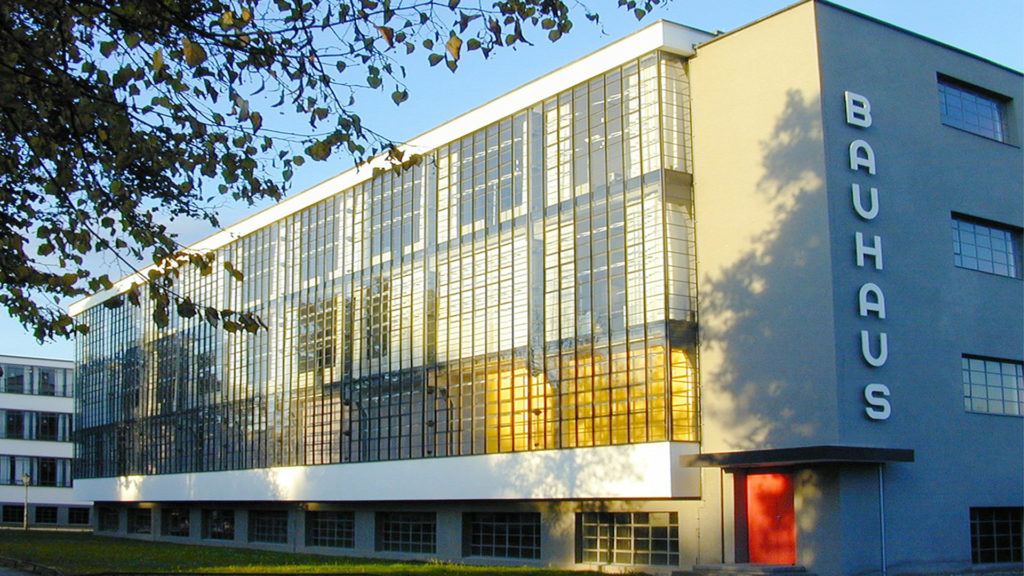Day of Study.One hundred years of Bauhaus

Monday closed
Tuesday to Sunday 11 am – 7 pm
Tuesday, 1 July 7 pm > 9 pm
Wednesday, 9 July 7 pm > 9 pm
Wednesday, 16 July 7 pm > 9 pm
book online
last entrance 8 pm
– for young people aged between 18 and 25 (not yet turned 25);
– for groups of 15 people or more;
– La Galleria Nazionale, Museo Ebraico di Roma ticket holders;
– upon presentation of ID card or badge: Accademia Costume & Moda, Accademia Fotografica, Biblioteche di Roma, Centro Sperimentale di Cinematografia, Enel (for badge holder and accompanying person), FAI Fondo Ambiente Italiano, Feltrinelli, Gruppo FS, IN/ARCH Istituto Nazionale di Architettura, Sapienza Università di Roma, LAZIOcrea, Palazzo delle Esposizioni, Amici di Palazzo Strozzi, Accademia Nazionale di Santa Cecilia, Scuola Internazionale di Comics, Teatro Olimpico, Teatro dell’Opera di Roma, Teatro di Roma, Università degli Studi di Roma Tor Vergata, Youthcard;
valid for one year from the date of purchase
– minors under 18 years of age;
– myMAXXI cardholders;
– on your birthday presenting an identity document;
– upon presentation of EU Disability Card holders and or accompanying letter from hosting association/institution for: people with disabilities and accompanying person, people on the autistic spectrum and accompanying person, deaf people, people with cognitive disabilities and complex communication needs and their caregivers, people with serious illnesses and their caregivers, guests of first aid and anti-violence centres and accompanying operators, residents of therapeutic communities and accompanying operators;
– MiC employees;
– journalists who can prove their business activity;
– European Union tour guides and tour guides, licensed (ref. Circular n.20/2016 DG-Museums);
– 1 teacher for every 10 students;
– AMACI members;
– CIMAM International Committee for Museums and Collections of Modern Art members;
– ICOM members;
– from Tuesday to Friday (excluding holidays) European Union students and university researchers in art history and architecture, public fine arts academies (AFAM registered) students and Temple University Rome Campus students;
– IED Istituto Europeo di Design professors, NABA Nuova Accademia di Belle Arti professors, RUFA Rome University of Fine Arts professors;
– upon presentation of ID card or badge: Collezione Peggy Guggenheim a Venezia, Castello di Rivoli Museo d’Arte Contemporanea, Sotheby’s Preferred, MEP – Maison Européenne de la Photographie;
MAXXI’s Collection of Art and Architecture represents the founding element of the museum and defines its identity. Since October 2015, it has been on display with different arrangements of works.


10 Jul 2025 09.00 pm
summer at MAXXI • cinemaCrazy for Footballby Volfango De Biasi
15 Jul 2025 > 14 Sep 2025
videogalleryFUORI GIOCOSguardi d'artista sul mondo del calcio
15 Jul 2025 09.00 pm
summer at MAXXI • talkIl cono d’ombra. La storia di Denis Bergaminiby Pablo Trincia
16 Jul 2025 09.00 pm
summer at MAXXI • musicKarimaCanta Autori
17 Jul 2025 07.00 pm
summer at MAXXI • talkCampioni: Vincent Candela
Carlo Scarpa room – free entrance subject to availability
10 seats reserved for holders of the myMAXXI card by sending an email to mymaxxi@fondazionemaxxi.it up until the day preceding the event
To mark the one-hundredth anniversary, two special events have been planned to pay tribute to the birth of the famous Bauhaus school that, in 1919, became a cornerstone for all innovative movements in the field of design and architecture.
4:30 p.m
Screening of the Bauhaus – Model and myth
The film, directed by Niels Bolbrinker and Kerstin Sutterheim, provides a unique image of the Bauhaus, institution symbol of Modernism, through the direct testimonies of former students and a selection of archival materials that reproduce the words of their masters.
Bauhaus – Model and myth is a critical account of the artistic and political goals of the Bauhaus, perhaps the most exhaustive that has ever been made into a film. A story in which an internal and unprecedented point of view is returned on the essence of the Bauhaus principles, the conflicts that led to the relocation of the Weimar headquarters to Dessau, the closure of the school during the Nazi era, the construction activity in the young state of Israel up to the emergence of the “Bauhaus myth” in the United States.
6:00 p.m.
Lectio Magistralis by Barry Bergdoll
Curator of the Bauhaus 1919–1933: Workshops for Modernity exhibition held in 2009 at the MoMA, Barry Bergdoll will be the protagonist of a lesson to understand the history and meaning of the school.
Inaugurated in Weimar under the direction of Walter Gropius, the Bauhaus represented the most industrialist and socially conscious soul of Modernism, in opposition to the plastic and Mediterranean version of Le Corbusier. Some of the greatest artists of the time were teachers (and students) at the Bauhaus: including Klee, Moholy-Nagy, Schlemmer, Kandinsky, Peter Oud, and Mies van der Rohe. The objective of Gropius was the synthesis between the mass production and the aura of the single work, to be achieved through the use of new technologies and new knowledge in the field of psychological and social sciences.
The original version of the film in German will be screened with subtitles in English
In collaboration with the Goethe-Institute Rome